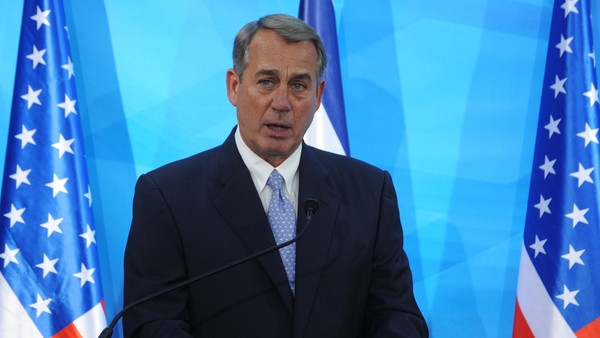France: No deal yet on when to lift Iran’s sanctions
AFP and Reuters
Friday, 3 April 2015
France’s foreign minister warned Friday that the tricky issue of when crippling sanctions on Iran would be lifted following a framework deal over its nuclear program was “not yet solved.”“The Iranian want sanctions to be lifted immediately,” Laurent Fabius told Europe 1 radio station.“We say to them: we will ease the sanctions as you respect what you have agreed to and if you don’t live up to your commitments, of course we can return to the situation we had before. “On this point, there is not yet a deal,” said Fabius.
Fabius spoke after Thursday’s agreement aimed at curbing Iran’s nuclear drive, hailed as “historic.” Under the framework, Iran agreed to sharply curtail its nuclear program in return for the lifting of sanctions that have crippled the country’s economy.
France, which presents itself as one of the more hawkish of the world powers negotiating the deal, has warned that sanctions will be re-imposed if Tehran fails to live up to its side of the bargain. “We are going in the right direction … but we are not yet at the end of the road,” stressed Fabius.
The main outlines agreed after eight days of talks that sometimes went through the night in the Swiss city of Lausanne now have to be finalized in a highly complex agreement by June 30. Meanwhile, Turkish Foreign Minister Mevlut Cavusoglu on Friday welcomed the deal, but said he hoped Tehran would go further by the deadline for a final deal at the end of June. “When we look at the positions (of the) P5+1 right now, Iran is still below the line we were able to bring in (previous negotiations) in 2010, but we hope Iran will come to that line,” Cavusoglu said during a trip to Lithuania. On Friday, Israel re-iterated its warning that a deal with Iran was “very dangerous,” accusing Tehran of seeking an atomic weapon. “This framework (agreement) is a step in a very, very dangerous direction,” government spokesman Mark Regev told journalists, adding that Iran’s “single goal” behind the accord was to build a nuclear bomb.
Boehner demands Congress to review Iran accord
U.S. House Speaker John Boehner holds a press conference with Israeli Prime Minister Benjamin Netanyahu at the prime minister’s office in Jerusalem on April 1, 2015. (AP)
AFP, Washington
Friday, 3 April 2015
U.S. Republicans expressed skepticism about Thursday’s deal to curb Iran’s nuclear program, with House Speaker John Boehner demanding Congress be allowed to review the accord before crippling economic sanctions are lifted. Several House and Senate members expressed cautious optimism about what President Barack Obama called a “historic understanding” reached between six world powers and Iran, a deal he assured would, if followed, prevent Iran from developing a nuclear bomb. Boehner slammed it as an “alarming departure” from the White House’s initial goals, suggesting the Obama administration caved to Iranian negotiators and allowed certain concessions.
“My immediate concern is the administration signaling it will provide near-term sanctions relief,” Boehner said in a statement. “Congress must be allowed to fully review the details of any agreement before any sanctions are lifted.” According to parameters released by the White House, sanctions on Iran will be suspended “after the IAEA (International Atomic Energy Agency) has verified that Iran has taken all of its key nuclear-related steps,” but they could snap back into place if Iran fails to fulfill its commitments. Senator Mark Kirk, among the most hawkish Republicans on Iran and co-author of legislation that tightens sanctions, minced no words in reacting to the agreement.
“Neville Chamberlain got a better deal from Adolf Hitler,” Kirk sneered, referring to the 1930s British prime minister and his disastrous policy of Nazi appeasement. Obama starkly warned lawmakers that if Congress “kills this deal… then it’s the United States that will be blamed for the failure of diplomacy.” Republican 2016 presidential hopefuls challenged the accord’s viability. Former Florida governor Jeb Bush described the agreement as “flawed,” arguing it included “significant concessions to a nation whose leaders call for death to America and the destruction of Israel.”
“Nothing in the deal described by the administration … would justify lifting U.S. and international sanctions,” Bush said. Former Texas governor Rick Perry said on Twitter that Americans have a right to be wary of a deal “riddled with concessions by the Obama administration,” while Senator Marco Rubio warned that Iran being able to keep 6,000 of its 19,000 centrifuges indicates “that this deal is a colossal mistake.” Senate Foreign Relations Committee chairman Bob Corker urged lawmakers to “remain clear-eyed” about Iran, and reiterated his insistence that Congress review any final deal with the Islamic republic.
Corker introduced legislation that would compel Obama to run the accord past Congress. He said there was “growing bipartisan support for congressional review of the nuclear deal,” adding he was “confident of a strong vote on the Iran Nuclear Agreement Review Act” when his committee takes it up on April 14. Senate Democrat Robert Menendez also backed congressional action. “If diplomats can negotiate for two years on this issue, then certainly Congress is entitled to a review period of an agreement that will fundamentally alter our relationship with Iran and the sanctions imposed by Congress,” he said.
Senate Minority Leader Harry Reid said he was cautiously optimistic about the deal, and warned against “rash action” in Congress. “In the coming days and weeks, we should all take a deep breath, examine the details and give this critically important process time to play out,” he said.

















